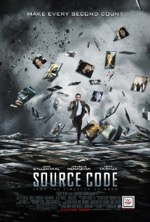Source Code (PG-13)
22/01/14 22:17 Filed in: 2011

Starring: Jake Gyllenhaal
April 2011
Too soon on the heels of Inception (2010) or The Adjustment Bureau (2011)? Perhaps, but director Duncan Jones’ (Moon) Source Code is more derivative of TV series than heady, mind-trip flicks.
Exhibit A: Quantum Leap (1989-1993). Scott Bakula’s Sam Beckett leapt into different people (and the occasional space chimp) on a weekly basis to rectify some past wrong. In order to identify what person he was impersonating, all Sam had to do was look in the mirror—a concept that Source Code exploits early in its narrative.
Exhibit B: Seven Days (1998-2001) a lesser known UPN sci-fi series centered on the exploits of Frank Parker (Jonathan LaPaglia), a Navy captain who is sent back in time seven days (in Source Code it’s a breezy eight minutes) before a major catastrophe in order to avert it. Source Code borrows liberally from the premise and trappings behind Seven Days, right down to the military officer as the central character, a dubious space/time apparatus and multiple jumps backwards and forwards through time.
Exhibit C: 24 (2001-2010) Counter-terrorist agent Jack Bauer (Kiefer Sutherland) must thwart terrorist plots designed to cripple or nation in a perpetual race against time. Since Source Code deals with acts of terrorism in metropolitan areas, specifically a bomb on the train, we can also cite 24 as a possible antecedent to Jones’ shifty/trippy yarn.
Jones’ direction is taut, especially his stylistic flourishes to signify time travel and time compressed montages for less significant loops, and the performances are solid across the board (although Gyllenhaal and Monaghan’s foisted romance is a bit saccharine and Jeffrey Wright’s attempts at channeling a techno-babbling scientist are less than stellar). The movie fails to soar due to the myriad contrivances upon which its premise and story are based. Even the concept of learning more clues with each new perspective is reminiscent of Vantage Point (2008), which was heavily influenced by Kurosawa’s Rashomon (1951).
The conceit of a time traveler stuck in a causality loop has been explored ad nauseam in the sci-fi pantheon and, unfortunately, Source Code adds very few new riffs on the formula. The only innovation here is Jones’ opaque coda, which will leave at least half the audience scratching their heads as they exit the theater (I’m pretty sure I get it, but I’m not one hundred percent sure myself). The plot was satisfactorily concluded about fifteen minutes from the end, so why did the movie overstay its welcome? Jones’ parting shot is counterintuitive in that it risks confusing a significant segment of the audience over a mind-bending “ah-ha” denouement that could’ve just as easily been left on the cutting room floor. If you get the film’s conclusion, good for you; if not, join the club.
You’ve seen it all before, but maybe Source Code’s fresh faces and unique assemblage of standard plot devices will keep you entertained. I’ve got to admit that I had high hopes for this one, but in the end, Source Code is largely a waste of time.
Rating: 2 1/2